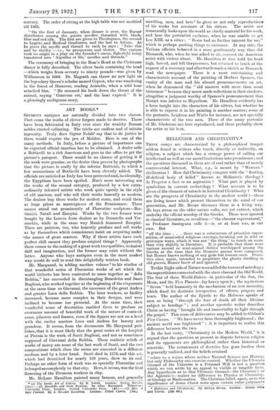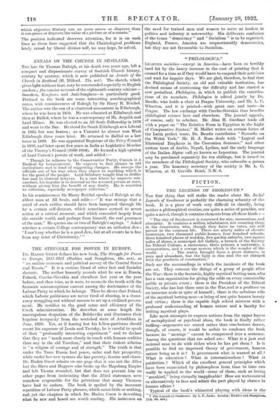HELLENISM AND CHRISTIANITY.*
THESE essays are characterized by a philosophical temper seldom found in writers who touch, directly or indirectly, on religion, a subject which has a strange power of calling our intellectual as well as our moral limitations into prominence; and the questions discussed in them are of real rather than of merely controversial interest. What, e.g., is meant by " Western " civilization ? How did Christianity compare with the " floating, ill-defined body of belief " known as Hellenistic theology ? Is Progress a fact or an aspiration ? What part is played by symbolism in current eschatology ? What account is to be given of the element of miracle in historical Christianity ? What are the prospects of Christianity in the modern world ?—these are living issues which present themselves to the mind of our generation, and Mr. Bevan discusses them in a living way. He lays stress on the older nature cults, not yet extinct, which underlay the official worship of the Greeks. These were ignored in classical literature, as occultism—" the obscene supernatural," as Professor Santayana calls it—is, or at least was, in our own. But " all the time . . . there was a substratum of primitive super- stition, of unsatisfied religious cravings, breaking out in wild or grotesque ways, which it was not ' the thing ' to touch on more than very slightly in literature. It is probable that there were various animal or semi-animal deities worshipped among the Greeks at the time that the Homeric poems were composed, but Homer knows nothing of any gods but human ones. Primi- tive rites, again, intended to propitiate the ghosts dwelling in old graves, Homer knew of and ignored."
To this Night-side of Nature were added the terrors of astrology ; the superstitions connected with the stars obsessed the Old World. The fear of these World-Rulers—in particular of the Sun, the Moon, and the Five Planets—lay heavy upon it ; the mysterious " Seven " held humanity in the mechanism of an iron necessity, which fixed its destinies irrespective of efforts, prayers and tears. The author of the Epistle to the Hebrews speaks of men as being " through the fear of death all their lifetime subject to bondage " ; and another apostolic writer describes Christ as having " brought life and immortality to light through the gospel." This sense of deliverance may be added to Gibbon's Five Causes. " We have never been thoroughly frightened ; the ancient world was frightened" : it is important to realize this
difference between the two.
In the last essay, " Christianity in the Modern World," it is argued that the questions at present in dispute between religion and its opponents are philosophical rather than historical or scientific. The restatement of doctrine has gone further than is generally realized, and the beliefs retained
" relate to a region whore neither Natural Science nor History, but only Philosophy can exercise control. Whether the Ultimate Ground of the Universe is a Personal Will is not a question which we can settle by an appeal to visible or tangible facts. Any hypothesis as to this Ultimate Ground—the Christian's or the Agnostic's—makes no difference to Physics or Chemistry, or Geology or Mathematics. The Christian belief, again, as to the significance of Jesus Christ rests upon certain value-judgments • HeUenisin and Christianity. By Edwyn Bevan. London : George Ansa and tinw1n. L12.a. ad.] which objective History can no more prove or disprove than it can prove or disprove the value of a picture or of a sonata."
The position indicated deserves attention, for it is on such lines as those here suggested that the Christological problems lately raised by liberal divines will, we may hope, be solved.



































 Previous page
Previous page